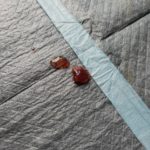It’s possible that Yuca simply doesn’t enjoy puppies. And that’s NORMAL and perfectly okay! Puppies are annoying. Your best bet is to put a LOT of attention on working Coco’s brain more. A tired puppy is a good puppy, and the BEST way is to work their brain. This would be obedience training, beyond basic sit/stay/down. I know group classes aren’t really a “thing” right now, but I’d look into classes through Denise Fenzi’s dog sport academy: https://www.fenzidogsportsacademy.com/
Maybe work Yuca while you’re at it. It’s a good way to keep her engaged, and working them together can help.











Hello!
The best ways that I know to avoid bladder stones is a good diet. Leaving fresh clean water available at all times and checking a urine every 6-12 months. Also on some little dogs I can palpitate rhe bladder for clues about its contents. If you want to be super pro active an X-ray or ultrasound is the best diagnostic tool for looking inside the bladder.
Good luck! Thanks for the question
Thank you! I will follow up with regular palpation and urine testing.
Could my dogs’ diet be better in the context of bladder stones?